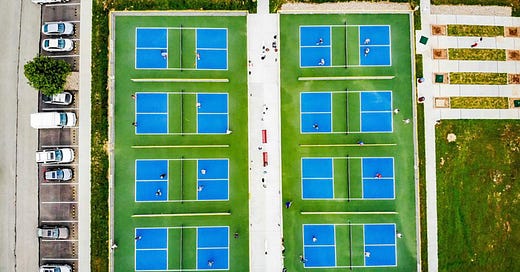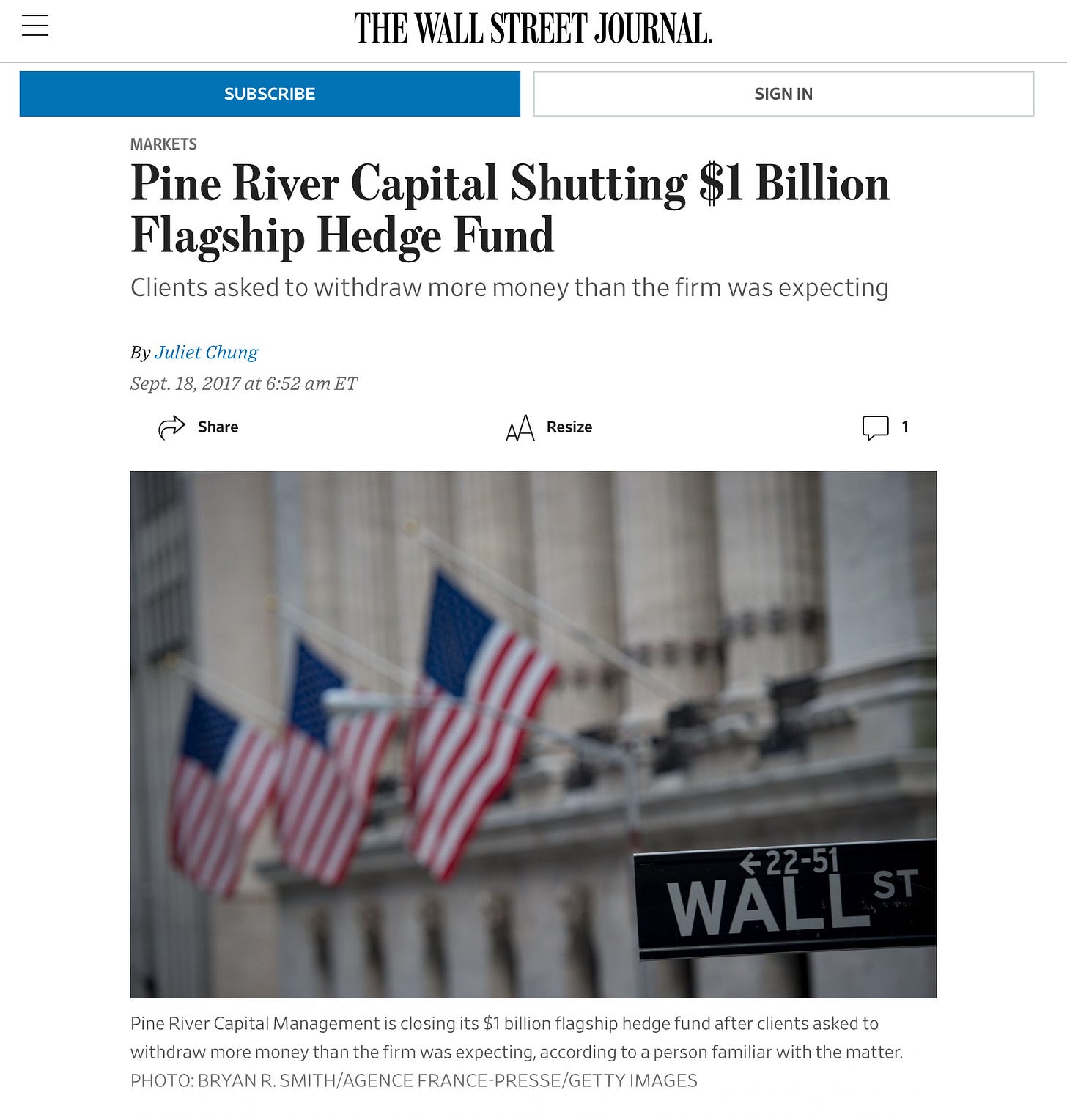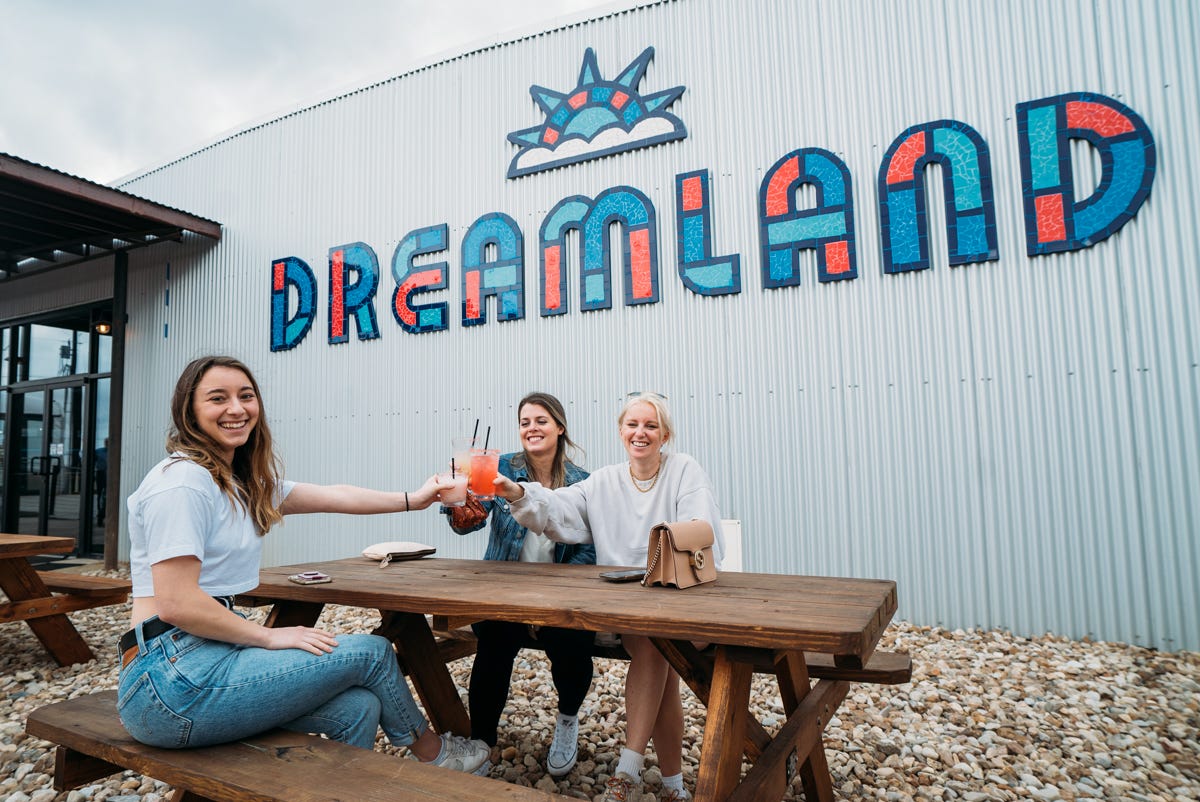We’ve all heard about it, our friends have begged us to play, our grandparents have already blown out their rotator cuffs, and anyone who loves tennis probably hates this fad like the plague. So strap in and get ready, it’s time to talk about the increasingly bizarre machinations surrounding Pickleball.
The sport itself was started innocently enough by Barney McCallum, Bill Bell, and Joel Pritchard as a tradition amongst family and friends, and carried a burgeoning cult-following for several decades, stewarded in the main by the United States Amateur Pickleball Association. However the game began to truly pick up steam around 2018, when the USAPA partnered with Desert Champions LLC and Indian Wells Tennis Garden owner Larry Ellison, Oracle CTO and famed aspiring US TikTok operations head/Netanyahu-Trump ally/Musk Twitter sponsor.
Over the next several years, encouraged by various marketing efforts, Pickleball’s player base grew by an average of ~20% year over year and eventually exploded in 2022 with 30% growth in official membership reported by the (rebranded) USAP.
Like any sport there was always a business side to Pickleball - as one would expect, but recently things began moving in a much more concerning direction. And indeed from the moment I’d ever heard about this trendy new game, a few questions lingered in my mind - the first being: what’s actually going on here with the real estate?
After all, tennis courts are rather burdensome uses of land (or so they say), why not scale down their footprint and streamline the entire prospect of community recreation? What, inquiring reader, could be more sensible?
Unfortunately, this all quickly brought about tense standoffs over tennis clubs, zoning rights and the use of public parks. Exacerbating this issue, throughout the entire COVID-19 pandemic the media seemed to be megaphoning the appeal of our new national sport to anyone who would listen.
Media exposure also continued to drive awareness with several national segments on NBC’s The Today Show, CNBC, BBC News, Live with Kelly and Ryan, and stories published within top-rated publications including, The New York Times, Vanity Fair, Forbes, Allure, The Boston Globe, The Economist, USA Today, Sports Illustrated, Parade, and Axios.
The Sports & Fitness Industry Association (SFIA) named pickleball the fastest-growing sport in America for the second consecutive year in its annual 2022 Topline Participation Report.
As this aggressively advertised game amassed favor in the public consciousness, the amateur sporting community was plunged almost overnight into a media-fueled figurative civil war.
Then just as luck would have it, strange billionaires entered the picture (as they are prone to do) with an ostensible “solution” to this issue, having apparently decided to embark upon a sprawling commercial real estate scheme, repurposing desolate shopping centers (owned by prominent American-Jewish megamall oligarchs) for the sport and weirdly outfitting their interiors with phone app-linked surveillance cameras. (Similarly, Larry Ellison, aforementioned owner of the IWTG and host of the National Pickleball Championships, has also invested in bringing a data-gathering big-tech flair to both pickleball and tennis - alongside ridiculously lavish amenities and the headaches of the local community.)
So who really is the “Pickleball King” Steve Kuhn, founder of Picklemall and Major League Pickleball? Why is a subprime mortage-backed securities wizard so interested in this sport anyways?
Isn’t it unusual how he made a fortune at Pine River Capital buying up toxic subprime assets, undervalued on the cheap in 2008/2009? And doesn’t anyone else think it’s odd how he lived in China for 3 years just before he began his career at at this curiously China-based/invested hedge fund, and how that whole ordeal ended up just a few years ago?
Perhaps even more interesting, the competing Professional Pickleball Association recently partnered with FanDuel to run the first legalized nationwide gambling operation based on the new sport. Also notable is the involvement of Carvana (sponsor of the PPA Tour and the future National Pickleball Championships), a company initially funded by obscenely wealthy convicted white-collar felons. The PPA itself is now owned by NHL enthusiast/former subprime-lender billionaire Thomas Dundon.
Many such worrisome developments surround the new corporate culture of Pickleball, which I doubt will ever be sufficiently addressed for those concerned. But whatever’s actually going on here, these aren’t exactly the types of people you’d love to see at the forefront of national community revitalization projects.
Kuhn and company launched Dreamland in 2022, in what appears to have been a proof-of-concept test for the Picklemall rollout, in Dripping Springs, Texas. But given what we know, was all this really about the business of public recreation?
Or was this about the uncomfortably familiar corporate model that plagues our age - repurposing pre-existing infrastructure and bringing businesses to market at incredible valuations, promoting various dubious products and services all the while, and perhaps selling it all off once the going gets tough? I suppose time will tell, but I’m certainly not the only one with a bad feeling about how this might end up - keep in mind that perhaps no sport in the national memory has been so controversial.
And again, various shady business aspects aside, is this sort of manufactured overhaul of our cherished pastimes something we really need more of in contemporary American life?
…pickleball has been growing at an explosive pace, fueled by a well-funded hype machine and the backing of celebrity investors such as Mark Cuban and LeBron James. Participation has more than doubled in each of the last three years, and pickleball boosters now claim some 36.5 million players, up from only a few million in 2020 (tennis has also been growing, though more slowly).
The most recent fact sheet from USA Pickleball brags that the country is adding some 130 new pickleball locations per month, which, in practice, often means tearing down existing tennis courts. The resulting conflict between tennis and pickleball players has become a regular feature of the small-town press and a recurring subject for trend pieces in the New York Times.
Many might wish to salute Pickleball’s promoters for their self-professed community-building efforts, and I would respect that otherwise healthy instinct. Regardless, there’s just something intuitively wrong about where Pickleball is headed in the business world. We’ve seen this movie before, and if we’re honest with ourselves, many of us sense that something very strange is going on here.
There’s a specific vibe common to all these gimmicky venture-capital plays, whether it’s the oddly celebrated downsizing, the nonchalant data-collection, or the sense of disregard for the public well-being, to say nothing about the rebranding of commercial real estate schemes or legalized bookmaking shops under the cover of family-friendly buzzwords written in bright day-glo lettering.
As a historical counter-example, tennis itself is a sport with centuries of organic tradition behind it, not to mention its Olympic legacy. Say what you will about the less reputable aspects of tennis, it’s never looked anything like this.
While Pickleball may be well and good as a sport, doesn’t it feel like a tragedy that we’ve been so easily manipulated into abandoning an important part of our culture, just so some sketchy billionaires can make a few extra bucks?
Like so many of the great “innovations” in our time, Pickleball looks like it’s become yet another opportunistic encroachment on something truly valuable, something with roots in the ground, something real, all to further prop up the bottom line of an elite/unsavory few. So maybe, just maybe, we should think twice about the “disruption” of our recreational pastimes. Because at the end of the day, they might be some of the most important institutions we’ve got.









Yet another racket indeed 🤣